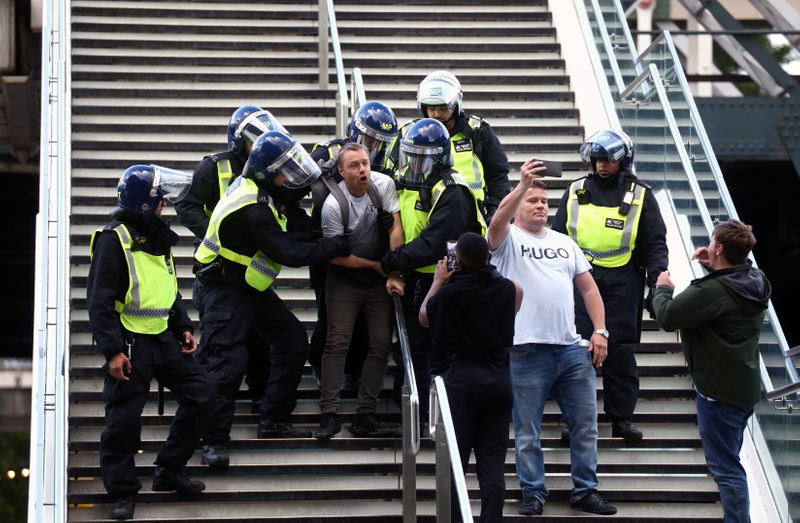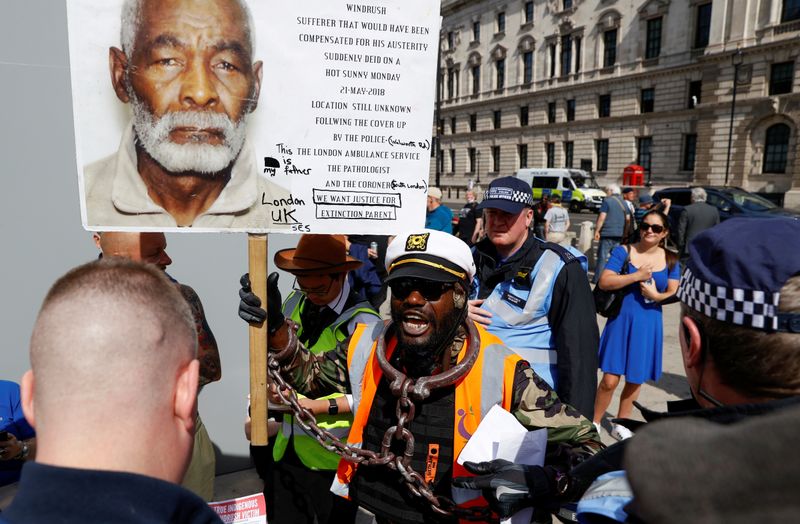By Michael Holden and Guy Faulconbridge
LONDON (Reuters) - British Prime Minister Boris Johnson condemned "racist thuggery" after far-right protesters clashed in London on Saturday with anti-racist demonstrators and police trying to keep the two sides apart.
Fights broke out between groups outside Waterloo station, with fireworks thrown before police cordoned off areas. On a nearby bridge, stones were lobbed at police. Sporadic skirmishes continued in parts of the city centre.
"Racist thuggery has no place on our streets," Johnson said on Twitter. "Anyone attacking our police will be met with the full force of the law."
Earlier in the day, small bands of protesters jostled and tossed bottles and cans in Trafalgar Square (NYSE:SQ). Far-right groups shouted racial slurs at the anti-racism protesters, and some tried to use metal crash barriers to break through police lines.
The Metropolitan Police said they arrested more than 100 people for offences including violent disorder and assault on police, and that six officers had suffered minor injuries. The ambulance service said it had treated 15 people.
"It is clear that far-right groups are causing violence and disorder in central London, I urge people to stay away," Mayor Sadiq Khan said on Twitter.
In a brief respite to the animosity after the clashes near Waterloo, pictures showed a man identified by the crowd as a far-right protester being carried to safety by a Black Lives Matter protester.
The police, who had already imposed a restriction calling for all demonstrations to end by 5 p.m., urged people to disperse.
Police also said they would investigate after images on social media appeared to show a man urinating on PC Keith Palmer's memorial. Palmer, a police officer, was stabbed to death in an attack outside Parliament in 2017.
There have been demonstrations around the world against racism and police abuses since the death of African American George Floyd in Minneapolis last month. In British cities tens of thousands of people have marched peacefully during previous days of protest.
In London the demonstrators numbered fewer on Saturday than in recent days, after announcements by far-right groups that they would converge on the city centre prompted anti-racism activists to cancel a planned march and instead call for scattered protests.
Statues of historical figures including Winston Churchill were boarded up to prevent them from becoming flashpoints or being defaced by protesters who say such monuments celebrate racists.
'MY CULTURE UNDER ATTACK'
In and around Parliament Square, hundreds of people wearing football shirts, describing themselves as patriots and chanting "England, England" gathered alongside military veterans to guard the Cenotaph war memorial.
The far-right groups said they wanted to defend British culture, in particular historical monuments, after the toppling of the statue of a 17th century slave trader in the port city of Bristol during an anti-racism protest last weekend sparked calls for others to come down.
"Winston Churchill, he's one of our own," they also chanted, near the statue of the World War Two leader, which last weekend was sprayed with graffiti reading: "Churchill was a racist".
"My culture is under attack. This is my culture and my English history: why should Churchill be boarded up? Why is the Cenotaph attacked? It is not right," said David Allen, one of the protesters.
While Churchill is admired by many for his role in defeating Nazi Germany, some in the anti-racism movement have called for more scrutiny of his overall legacy, noting he expressed racist and anti-Semitic views.
On Friday Johnson called it "absurd and shameful" that the Churchill statue was at risk of attack. "Yes, he sometimes expressed opinions that were and are unacceptable to us today, but he was a hero," he said.

Protests took place in other countries on Saturday, including in several Australian cities, Taipei, Zurich and Paris.
